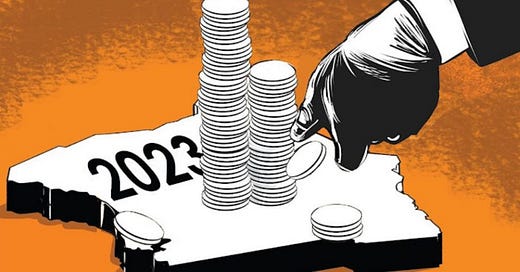Kenya's Court of Appeal Reverses Suspension on 2023 Finance Act
Kenya's Court of Appeal has made a significant decision, overturning a previous order that had suspended the implementation of the 2023 Finance Act. The suspension, which had been in effect since June 30, was lifted after Treasury Cabinet Secretary (CS) Prof Njuguna Ndung'u presented arguments claiming that the government was incurring massive losses of half a billion shillings every day due to the freeze.
The crucial ruling came from a three-judge bench of the Court of Appeal, following an appeal filed by Prof Ndung'u. According to the CS's estimations, the Kenyan government was projected to lose approximately Ksh211 billion ($1.48 billion) in the current financial year if the suspension persisted.
Prof Ndung'u expressed concern that the freeze would pose significant challenges to implementing the 2023/24 budget under the Kenya Kwanza administration. The government relies on the proposed revenue raises outlined in the Finance Act to adhere to the budgetary plans and fulfill important projects. Without this, the CS warned that some projects may need to be halted until alternative solutions are found.
Effect of the lifting of this order (these taxes take effect from 1st July 2023)
Same-day collection of betting gaming and lottery tax
5 % of withholding tax on digital content monetization
5% withholding tax on sales, promotion, marketing, and advertising services offered by resident persons
Capital gains tax on transfer of shares, partnership interests, or comparable interests where they derive more than 20% of their value
3% turnover tax for businesses with revenue of between 1-25 million
Exemption of LPG from 8% VAT
16% VAT on petrol, Kerosene, aviation fuel, jet fuel
Import of raw materials and intermediate products by manufacturers is now 2.5% (up from 1.5%)
1.5% housing levy
Click here to read the full article
ECONOMY
IMF Urges Higher Interest Rates to Attract Government Securities Investors
The International Monetary Fund (IMF) has reiterated its stance on offering increased interest rates to investors in government securities as a means to encourage higher investor subscriptions. In a recently published report, the IMF highlighted that smaller increments in rates for medium to long-term bonds had posed challenges to the government's net domestic financing program during the 2022/23 financial year. This predicament emerged as investors shifted their focus towards shorter-dated securities, particularly Treasury bills, which experienced a more rapid increase in yields.
The IMF's analysis pointed out that Treasury bill rates surged between 2.05 percent and 4.04 percent from the end of May to June 23, demonstrating the attractiveness of these shorter-term investments.
Conversely, the less substantial growth in long-term domestic bond rates contributed to a shift in demand towards the shorter end of the yield curve, leading to increased rollover requirements for the government's financing needs.
To address these challenges, the IMF urged the government to consider implementing higher interest rates on its securities, particularly for medium to long-term bonds.
By doing so, it would create a more enticing investment environment for potential investors and help stabilize the government's domestic financing program. Additionally, this move could help strike a balance between short and long-term investments, fostering a healthier and more sustainable financial landscape for the country.
Click here to read the full article
CAPITAL MARKETS
Foreign investor flight from the NSE
Foreign investor outflows are projected to exert a significant influence on the performance of the Nairobi Securities Exchange (NSE) during the latter half of 2023.
Despite a recent positive development in portfolio flows, where foreign investors experienced net inflows for the first time in over a year last month, analysts remain cautious about the outlook. The anticipated continuation of negative market sentiment and ongoing tightening of monetary policies in advanced economies are seen as primary factors deterring foreign investors from the Nairobi bourse.
According to experts at AIB-AXYS Africa,
the prevailing negative investor sentiment towards emerging and frontier markets, coupled with a pessimistic outlook on the local currency, is expected to trigger further sell-offs by foreign investors in the second half of the year.
However, the rate of these sell-offs is predicted to slow down compared to previous periods. The analysts highlighted that the allure of higher returns resulting from the continuous hiking of benchmark rates in developed markets is likely to drive more foreign exits from the NSE.
In light of these projections, market participants and local authorities are keeping a close eye on the situation, hoping for signs of stabilizing trends and exploring potential measures to mitigate the adverse impacts on the Nairobi bourse.
Click here to read the full article
Kenya Revenue Authority Raises Fringe Benefits Tax, Impacting Workers and Employers
In a move that has dealt a blow to workers and employers alike, the Kenya Revenue Authority (KRA) has recently announced an increase in the tax rate charged to employers granting employee benefits. The adjustment entails raising the fringe benefits tax to 11 percent, and this higher rate will be in effect for the next three months until September. This marks the second successive raise in the fringe benefits tax since the April-June window, and it comes as a response to the prevailing high market interest rates.
According to the KRA's statement, the 11 percent rate for the fringe benefits tax will be applicable for the months of July, August, and September 2023. The levy is paid by employers on specific benefits provided to employees, their families, or other associates. This means that employees receiving extra welfare benefits, such as low-interest loans in addition to their regular wages, will now be subject to a higher tax burden during this three-month period.
The decision to increase the fringe benefits tax is likely to have significant implications for both employers and employees. With higher tax obligations on the benefits offered, employers may face increased costs, which could impact their ability to provide additional perks to their workforce.
Click here to read the full article
PUBLIC SECTOR
Kenya Commits to Approve Updated Classification of State-Owned Enterprises by Year-End
In a bid to address the challenges posed by struggling State-owned enterprises (SOEs) and safeguard taxpayers' interests, Kenya has pledged to approve an updated classification of these entities by December 31. The commitment comes as part of Kenya's agreement with the International Monetary Fund (IMF) to undertake crucial reforms in its parastatal sector.
Haimanot Teferra, the IMF's Mission Chief to Kenya, revealed that the government is presently working on a draft policy aimed at enhancing ownership structures and transparency within SOEs. This move is seen as a key component of the ongoing program with the IMF and is expected to streamline operations and governance in these public entities.
Teferra stated, "We understand there is now a new updated inventory and new classification of State-owned enterprises which should be approved by the Cabinet towards the end of 2023." Additionally, a draft ownership policy is in the works, which will prescribe a revamped governance framework and legal ecosystem to bolster performance and transparency in SOEs. This policy is set to be a structural benchmark for the program and is anticipated to be completed by October 2023.
Furthermore, the IMF highlighted that the government is actively engaged in evaluating the financial status of state corporations using the fiscal year 2022/23 audited accounts.
Click here to read the full article
WHAT YOU MIGHT HAVE MISSED
Nairobi exchange trails Africa peers on dollar returns in the first half of 2023
The equities market in Kenya posted the worst dollar-denominated returns for investors in the opening half of the year in contrast to peers.
The returns in six months to June as per data from Morgan Stanley Capital International Index (MSCI) show the market posted paper losses of 30.9 percent in contrast to losses of 24.3 percent for Nigeria and a contraction of 20.7 percent in Zimbabwe.
Hackers shake Kenya’s digital financial system
A major cyber-attack that caused an outage of more than 5,000 public services in Kenya for more than 48 hours while disabling Internet-based and mobile payment platforms has exposed the growing threat of payment service disruptions to the economy.
The attack hit a critical section of the country’s financial system with M-Pesa, a mobile service product that is fast turning into an artery for the circulation of money in Kenya’s economy, also disrupted.
CBK bans cash, cheque payment for bonds, T-bills
Investors in Treasury bills and bonds will no longer be able to make manual bids and payments for the securities at the Central Bank of Kenya (CBK) once the modernized Central Securities Depository (CSD) goes live from Monday.
The new CSD is an electronic over–the–counter trading platform that is meant to ease trading in the securities, improving liquidity and opening a more convenient avenue for Kenyans abroad to buy government debt.
The Kenya Revenue Authority (KRA) directed all traders, including those who ship their goods through a cargo consolidator, to pay taxes on their cargo per item and have them cleared within 21 days or be auctioned.
The directive, which is aimed at addressing cases of tax evasion through false declaration, is, however, turning into a crisis with a lot of traders complaining of clearance delays.






